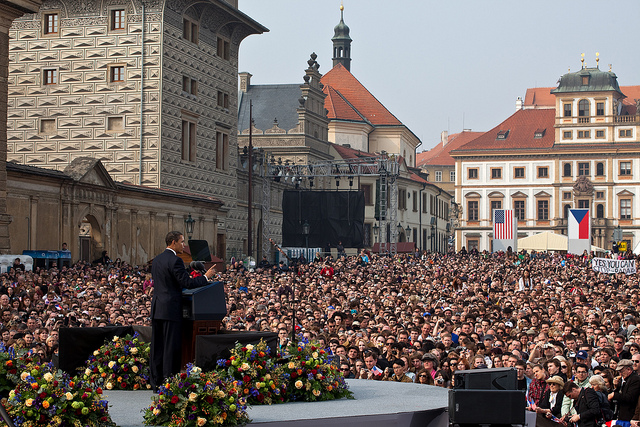by Peter Jenkins
It was just over four years ago, on 5 April 2009, that President Obama delivered remarks on the future of nuclear weapons in the 21st century. His remarks were received with hopeful enthusiasm throughout the world. They may have contributed to the decision to award him a Nobel Peace Prize later that year.
If today the Obama administration’s achievements are measured against the agenda that the President sketched out on that spring morning in Prague, the record can best be described as “mixed”.
The conclusion, in 2010, of a substantial agreement with the Russian Federation to reduce the number of nuclear warheads deployed by both sides is a worthy achievement. The administration has imparted momentum to global efforts to secure vulnerable nuclear material, and high-level political commitment. US support has helped to bring about the creation of an international nuclear fuel bank, so as to increase confidence in the sustainability of nuclear fuel supplies and narrow the rationale for national fuel supply programs.
But that’s about all.
The administration has not attempted to secure US ratification of the Comprehensive Nuclear Test Ban Treaty, which opened for signature in 1997 and, to date, has been ratified by 159 States. This is a serious blow to the cause of nuclear non-proliferation, because US non-ratification has provided Egypt, Israel, Iran, Pakistan, India, China and North Korea with an excuse not to ratify. Ratification by two of these States, Iran and North Korea, would in one case serve as an additional nuclear confidence-building measure, and in the other inhibit the development of reliable nuclear weapons.
The proposal for a multilateral Fissile Material Cut-Off Treaty remains becalmed. To be fair, this is not for want of US effort. It nonetheless has to be accounted as a setback on the President’s proclaimed path to a nuclear-weapon-free world.
And, third, the administration has failed to have any discernible impact on the nuclear program of the one state that was a manifest nuclear proliferation threat when the President spoke in Prague: North Korea. On the contrary, since April 2009 North Korea has conducted two nuclear tests, has threatened the deliberate first use of nuclear weapons, and has acquired at least one uranium enrichment plant to complement a small stock of plutonium.
Furthermore, the outlook for the Nuclear Non-Proliferation Treaty (NPT) has darkened. In 2010 the administration was able to take pride in having engineered a successful NPT review conference and stilled fears about the US commitment to the Treaty, fears which had been aroused by the G. W. Bush administration’s cavalier approach to the 2005 review conference.
On 29 April 2013, however, Egypt walked out of the second of three conferences tasked with preparing the 2015 review conference. They did so because the US, as they saw it, had failed to secure Israeli participation in exploratory work on creating a Middle East Nuclear-Weapon-Free Zone (NWFZ).
The administration may be inclined to shrug this off as a temporary glitch, which can be rectified by subjecting to pressure an Egyptian government that is financially dependent on the US and some US allies. If that is the case, however, the administration may be underestimating the importance Egypt attaches to the NWFZ concept and the readiness of the Egyptian government to risk US displeasure on this account. Israel’s un-avowed possession of nuclear weapons is a long-standing affront to Egyptian self-respect and a cause around which it is easy to rally the Non-Aligned States which constitute nearly two thirds of the NPT community.
I come at last to my main point. If I were a US official who had the ear of the President, I would want to argue for the burnishing of this mixed post-Prague record by treating Iran as a nuclear non-proliferation opportunity.
To those who are accustomed to hearing Iran described as a nuclear proliferation threat, that will sound like a crazy paradox. But that description does not accord with the facts. In reality the evidence points to Iran being a NPT party that is ready to re-affirm its non-proliferation commitment, to offer state-of-the art international monitoring of that commitment, and to clear up concerns about certain nuclear-related activities prior to 2004, in return for the US accepting that Iranian enrichment of uranium under safeguards and for peaceful purposes, is not a breach of the NPT, and lifting obligations imposed, at US behest, by the UN Security Council.
Settling the Iranian case on such terms would be entirely consistent with the vision sketched out by the President in Prague. It would show that the US had reverted to a classical interpretation of the NPT, to the interpretation which has helped to motivate 185 States formally to renounce nuclear weapons since 1968. It would strengthen, not weaken this central pillar of the international system.
Photo: President Barack Obama delivers his first major speech stating a commitment to seek the peace and security of a world without nuclear weapons in front of thousands in Prague, Czech Republic, April 5, 2009. (Official White House Photo by Pete Souza)





